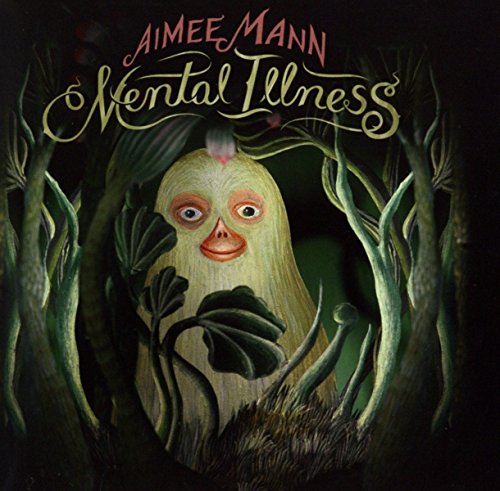Aimee Mann - Mental Illness (Album Review)
Mental Illness is the sort of provocative title a rapper might choose for a record but for Aimee Mann the name of her first album in five years is a tongue-in-cheek pre-emptive strike against the critics who've always labelled her output as depressing. She is, of course, guilty as charged but it's no apology - the title should be taken as a gentle warning: Mann mines the loneliness, anxieties and complicated human relationships that can so often be the cause of our mental malaise. The songs on this record aren't fairytales; they're personal, real and, more often than not, don't have a happy ending. It's this unflinching reflection of life's various disappointments that is part of Aimee Mann's appeal. Difficult, conflicting emotions aren't neatly reconciled; regrets don't disappear overnight and sometimes things just don't turn out as planned.
A contemporary of Madonna, Aimee Mann has been making music since her days fronting ‘Til Tuesday in the early 1980s. When you've made as many records as Aimee Mann has it's good to set some parameters in place and the songwriter has intentionally adopted an acoustic approach for Mental Illness. This means the songs are stark and uncluttered, allowing the resignation and sadness of the songs to be laid bare. Mann shares with Ben Folds the gift of charging humdrum, everyday observations with emotional meaning and her similarly deadpan vocal delivery - admittedly an acquired taste - has become her trademark. The chamber string arrangements, courtesy of producer Paul Bryan, are also a huge asset to the record; perfectly pitched and judiciously placed through the collection of songs.
The delicately fingerpicked opener ‘Goose Snow Cone’ is both delightfully weird and beautifully hopeless, immediately resonating with the album title. Its chorus of “Got to keep it together when your friends come by / Always checking the weather but they want to know why” paints a subtle portrait of its fretful protagonist and sets the tone well for the rest of the release. To follow, there are doomed, strummed waltzes in the self-explanatory ‘Stuck In The Past’ and ‘You Never Loved Me’; there is self-destruction in the simply picked ‘Rollercoasters’ and there is bewilderment in the catchy ‘Patient Zero’. There is desperate tragedy in ‘Lies of Summer’ and a bit more self-destruction for good measure in the Elliott Smithy oohs of ‘Philly Sinks’. Throughout, the characters in the songs are shown to be in denial about who they once were, who they are now and who they’re (not) going to be in the future. Mann is, for the most part, a semi-detached storyteller but elsewhere on the album she can’t resist being a straight-talking fingerpointer too, ‘Simple Fix’ and the excellent ‘Knock It Off’ being examples of her ability to call (in her words) a spade a spade.
When Mental Illness catches you in anything approaching a fragile state of mind it is really quite affecting and the choice of sparse arrangements is a key part of what makes it so powerful: Aimee Mann is right in your ear, telling complicated yet familiar tales of people like you and me. She understands that we are made up of the manifold truths we sell ourselves to keep afloat and that the way we construct our lives out of those fears and fantasies is a mental process. Yep, she’s been there too; yep, she knows how you feel and... nope, she’s not afraid to tell you to wake up and stop being an idiot. Find a dark room, a grey day and a good pair of headphones and drink this record in. If it doesn’t speak to you, you’re way too well.
Review by Rich Barnard.















A new name to me, but based on the new EP, ‘Tigers in Your Backyard (Nocturnal Edition)’, Molly Murphy is one to watch. Initially, Molly embarked on a promising college career as a double Film and English Major pursuing a career in screenwriting but left all that behind to form a band (as you do). Murphy’s latest release finds the singer-songwriter adding a modern sheen to her traditional Celtic roots.